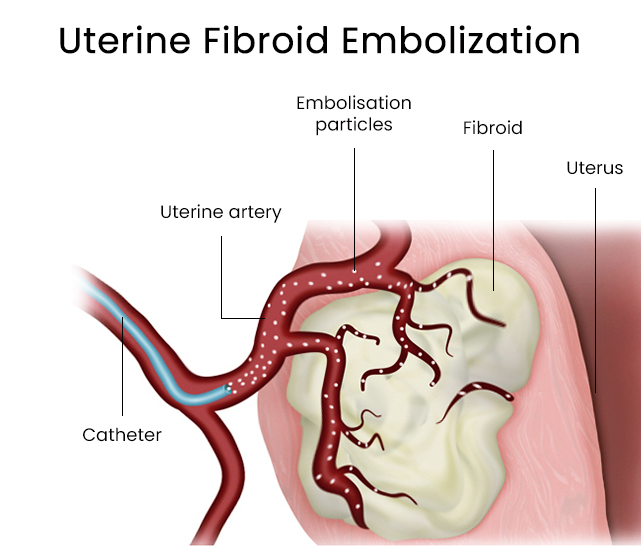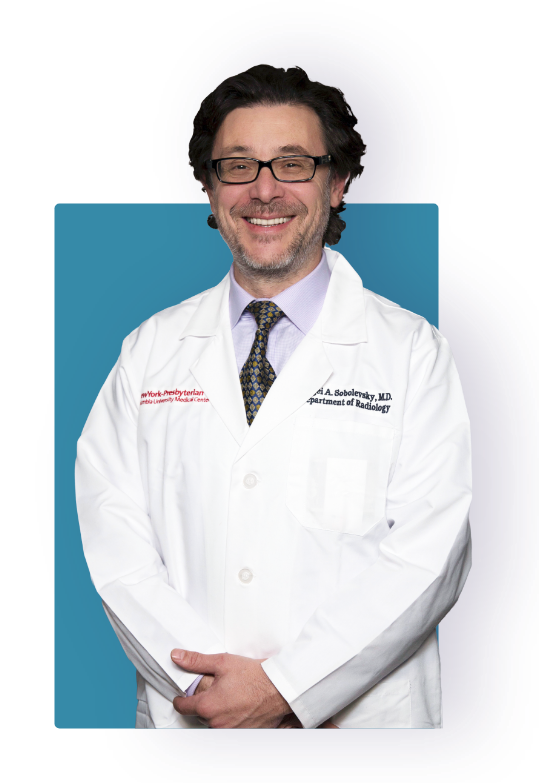Fibroids are non-cancerous growths that occur for a variety of reasons inside or outside your uterus. They can create significant uncomfortable symptoms, ranging from heavy bleeding to pelvic pain to infertility. The earlier you get treatment for fibroids, the better chance you have of avoiding uncomfortable consequences. At the Downtown Vein & Vascular Center in Brooklyn, one of the most common and effective treatments for fibroids is a uterine fibroid embolization. This process is easy to manage and leaves your uterus intact for future pregnancies. Call the expert in New York City for fibroids uterine artery embolization.
What Is Uterine Fibroid Embolization?
Uterine fibroid embolization (UFE) — also known as a uterine artery embolization (UAE) — is a non-surgical treatment option for women with fibroid conditions. In this procedure, blood flow to the fibroids is blocked, forcing the fibroids to shrink. Your uterus begins to recover as the fibroids shrink and die off.
During UFE, your doctor inserts a catheter into a blood vessel. You’ll feel a bit of pressure, but nothing painful. Contrast medium is injected into the arteries of your uterus to help your doctor navigate the catheter to the correct place. Once a catheter is placed in a uterine artery, tiny particles are injected into it to cause near complete cessation of blood flow to the uterine fibroids, which causes them to gradually atrophy and disappear. When the doctor takes out your catheter, the fibroid embolization procedure is over. You return home the same day.
Uterine fibroid embolization is the right choice for many women with fibroids. Because it’s non-surgical, there are fewer risks involved with UFE than with some surgical fibroid treatment options, such as a myomectomy or hysterectomy. The Downtown Vein & Vascular Center offers uterine fibroid embolization treatment at its state-of-the-art facility, conveniently located in Downtown Brooklyn, serving all of Brooklyn and New York City.

Who Should Seek Uterine Fibroid Embolization Treatment?
For most women suffering from uterine fibroid pain, uterine fibroid embolization is an effective treatment plan. UFE provides relief for your fibroid symptoms, including pelvic pain, pain during sex and fibroid bleeding. Many women looking to avoid surgery choose uterine fibroid embolization for fibroid treatment.
But not everyone with fibroids is a good match for uterine artery embolization. Some health factors may disqualify you from seeking UFE treatment, such as if you:
- Don’t show symptoms. UFE isn’t necessary if you aren’t showing any symptoms of fibroids, a common occurrence when fibroids are discovered during a routine exam.
- Are pregnant. If you’re pregnant, UFE can’t be performed as it could be dangerous for the fetus.
- Have cancer or might have cancer. UFE isn’t recommended if you’re being treated for uterine cancer or have received a diagnosis of a uterine cancer.
- Have an infection in your pelvis. Any infection must be treated before uterine fibroid embolization can be performed.
- Have fibroids in a specific location. Depending on the location of your fibroids, surgical fibroid removal may be a more suitable treatment option.
Ensuring you’re a good candidate for uterine fibroid embolization is the first step toward your treatment plan. Doctors use a variety of tests to determine if UFE is the best course of treatment for you including:
- An MRI. An MRI is an imaging modality that helps determine the scope of your fibroid condition, define your anatomy and diagnose other conditions in your pelvis.
- A pregnancy test. This is done for all women of child-bearing years.
- Endometrial biopsy. Because uterine or endometrial cancer may cause bleeding, your doctor has to exclude the possibility of endometrial cancer prior to fibroid treatment in women over 40.
Dr. Sobolevsky provided excellent care during my vein treatment. He was professional, knowledgeable, and made me feel comfortable throughout the procedure. I’m thrilled with the results and would highly recommend him to anyone seeking vein treatment.
What Can I Expect During My Recovery?
A typical immediate post-procedural recovery after a uterine fibroid embolization takes between one and two weeks. While some women are comfortable and ready to return to normal activities the same day after the UFE procedure, others experience pain for several days after the as the fibroids die off due to lack of blood supply. Your doctor may prescribe pain medication and anti-nausea medication to manage these symptoms.
It takes weeks or months to start feeling significant relief from your fibroid pain symptoms. UFE begins the process of shrinking fibroids immediately, but the fibroids continue to shrink for three to six months before you observe an appreciable reduction in size. On the other hand, normalization of menstrual bleeding in the first month after your fibroid embolization is expected in most cases.
Uterine fibroid embolization has an 85 percent satisfaction rate from women who’ve undergone the procedure. It also treats adenomyosis.
Most women experience dramatic relief from debilitating and frustrating symptoms, such as:
- Fibroid pain in your pelvis and abdomen
- Weight gain that’s unexplained and due to your enlarged uterus and the actual weight of the fibroid clusters as they grow unabated without any treatment
- Severe menstrual cramps that too often go untreated because women just accept the severity of their monthly menses
- Frequent urination that’s caused by the pressure your enlarged uterus places on your bladder, which is embarrassing and can cause intimacy problems
- Heavy uterine bleeding when women suffer from excessively long and heavy menstruation, as well as bleeding between menses
A typical recovery from a uterine fibroid embolization takes between one and two weeks. While some women are comfortable and ready to return to normal activities the same day after their UFE procedure, others experience pain for several days the as the fibroids die off due to lack of blood. Your doctor may prescribe pain medication and anti-nausea medication to manage these symptoms.
Where Do I Get Uterine Fibroid Embolization?
UFE has fewer and less serious risks than surgical fibroid treatments, and it boasts a high success rate, especially when you rely on experts such as Dr. Sergei Sobolevsky and his qualified team.
If you show any signs of uterine fibroids or adenomyosis, don’t wait. Contact Downtown Vein & Vascular Center today to learn if you qualify for a uterine fibroid embolization. The practice serves all Brooklyn and New York City.

I am Dr. Sergei Sobolevsky, a leading specialist in endovascular medicine. Having performed over 25,000 procedures throughout my career, I bring decades of experience in vascular and interventional radiology to my practice. I obtained my Doctor of Medicine (MD) degree from the University of Colorado School of Medicine in 1997 and completed my specialty clinical training in vascular and interventional radiology at Harvard University.
My dedication to excellence in patient care has been recognized through accolades such as being named a Castle Connolly Top Doctor and inclusion in the Top Doctors New York Metro Area lists for 2020, 2021, 2022, and 2023. With licenses in multiple states, I have also shared my expertise through presentations at various institutions in the US and abroad.
More About Dr. SobolevskyDowntown Vein Treatment Center
480 Court Street, Ste 101
Brooklyn, NY 11231
(718) 787-5559

